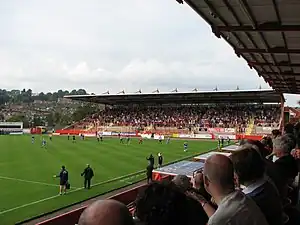St James Park (Exeter)
St James Park is a football stadium in Exeter and is the home of Exeter City FC. The stadium is served by the St James Park railway station, which is right next to the ground (the line runs behind the grandstand). It has been adopted by the club who contribute to its upkeep, under the community rail scheme, and its railings have been painted in the red and white of Exeter's strip.
The Park, SJP | |
 | |
| Full name | St James Park |
|---|---|
| Capacity | 8,219[1] |
| Field size | 104 x 64 metres |
| Surface | Grass |
| Construction | |
| Built | 1904 |
| Opened | 10 September 1904 |
| Tenants | |
| Exeter City Football Club (1904–present) | |
The capacity of St James Park following completion of a £3.4 million redevelopment project is 8,219. The record attendance is 20,984, who watched Exeter lose 4–2 to Sunderland in an FA Cup Sixth Round Replay in 1931.
Stands
The Stagecoach Stand and the away terrace were closed for the 2017/18 season to allow redevelopment work at the stadium, with away fans only allocated around 200-300 tickets in the main seated stand during that time. This temporarily reduced the stadium capacity to around 6,000.
In 2020, due to the COVID-19 pandemic, the televised second leg of the 2019/20 League 2 play-off semi-final between Exeter City and Colchester United was played at St James Park without spectators. Paying £25 each, Exeter City supporters provided 1,256 personal photographic portraits to a company called FaceInTheCrowd, and the company manufactured life size polypropylene "cutouts" which were placed in the Stagecoach stand for the match, and then transported to Wembley Stadium after Exeter won through to the play-off final. The supporters' payment for the cutouts, less production costs, was donated to the club. The supporters who wished to were able to reclaim their cutouts after the play-offs.[2]
The current certified capacity of the Stadium is 8,720 but, in order to comply with updated safety guidance, the operational capacity at St James Park is 8,219.[1]
| Stand | Other names | For | Capacity |
|---|---|---|---|
| Thatchers Big Bank | Big Bank / Cliff Bastin Stand | Home Fans | 3,960 (standing) |
| IP Office Stand | Cowshed / Doble Stand | Home Fans & Away Fans | 2,116 (seated) 200-300 (away seating allocation) |
| Stagecoach Adam Stansfield Stand | New Old Grandstand | Home Fans | 1,599 (seated) |
| Tracks Suzuki Away Stand | Away End / St James Road End | Away Fans | 1,045 (standing) |
History
In 1654 the land was owned by Lady Anne Clifford who rented it out for fattening pigs. The proceeds went to a charity set up to pay for the apprenticeship of a poor child from the parish of St Stephen, an arrangement that was supposed to be renewed "yearly to the world's end." Pigs were resident for nearly 250 years and in later times, were joined by other tenants of low repute. Prior to 1904, Exeter United FC played its games here and after merging with St. Sidwell's United, the ground was leased to the newly formed Exeter City FC with the new contract stipulating that "no menageries, shows, circuses or steam roundabouts" were to be allowed on the premises.
In the ground's early days, some visiting clubs complained about the ground claiming it wasn't regulation length, and both Stoke (in 1909) and Reading (1910) refused to play FA Cup games at the ground, although the matter was resolved in 1920 when the club purchased the land east of the ground and were able to extend the pitch and construct the Big Bank stand.
In 1921 the club was able to buy the site, thanks to money raised through the record breaking sale of Dick Pym to Bolton, and proceeded to develop the ground, adding a roof to the Cowshed stand and in 1926 rebuilding the Grandstand destroyed by fire the previous year.
Modern development
In 1994 the club encountered financial difficulties and the ground was sold to Beazer Homes, and was later purchased by Exeter City Council who leased it back to the club. Finances had improved by 1996 and the club began to redevelop St James Park, rebuilding the Big Bank stand (2000) and replacing the Cowshed terrace with an all-seater stand (2001). The neighbouring former St. James' School building was refurbished into new offices, a social club and corporate hospitality /conference and banqueting facilities.
Financial difficulties, including debt to stadium redevelopers Mowlem, caused the redevelopment plans to be put on hold but matters continued to decline, culminating in the club's most traumatic episode at the end of the 2002/03 season, when police raided the club and removed the recently instated chairman, his wife and the vice-chairman for questioning. Later that year the Supporters Trust took over day-to-day running of the club, and to overcome the financial problems entered into a CVA.
In 2005, thanks largely to the money generated from the FA Cup third round match at Old Trafford the previous year, the club came out of administration and the Supporters Trust began again to look at the redevelopment of the ground. In the meantime, much of the small scale maintenance and repair work has been undertaken by a volunteer workforce of fans organised by the Trust, using resources donated by local businesses.
In 2004, talks were held with the Exeter Chiefs rugby club, who were in with a good chance of obtaining promotion to the Zurich Premiership that season. Because the Chiefs 100-year-old County Ground didn't meet Premiership requirements and their new Sandy Park Stadium was not due to open for another season, the clubs were looking at a possible one year groundshare at St James Park. There were also talks of a future groundshare at the Sandy Park stadium should Exeter City decide to leave St James Park. In the end, the Chiefs missed promotion by 4 points to Bristol and were able to stay at the County Ground for the next season. Contractual restrictions on the use of Sandy Park halted talk of a future groundshare there too.
In May 2016, permission was granted for a redevelopment of the Old Grandstand (then known as the Stagecoach Family Stand), that would see the 90-year-old stand be demolished and replaced with a new 1,600 seat stand, which would be financed by the building of new student accommodation behind the Big Bank.[3] The option for a new, covered standing away terrace was also included and approved under planning permission. As part of the redevelopment, the club announced in October 2018 that the Old Grandstand's replacement would be named 'The Stagecoach Adam Stansfield Stand', in honour of the striker who died from cancer in 2010, at the age of 31.[4]
International matches
St James Park hosted an international fixture on 22 November 2006, when England Women's Under 21s took on France in a friendly match. The game finished 1–1.[5]
The Park also hosted the England C international match against Wales on 20 February 2008, which England won 2–1.
Photos
 The Adam Stansfield Stand, which replaced the Old Grandstand in 2018.
The Adam Stansfield Stand, which replaced the Old Grandstand in 2018. Old Grandstand.
Old Grandstand. Away Terrace.
Away Terrace. Big Bank.
Big Bank. The entrance to the players' changing rooms in the Old Grandstand.
The entrance to the players' changing rooms in the Old Grandstand. Panoramic view of St James Park, Exeter from the home dugout.
Panoramic view of St James Park, Exeter from the home dugout. Panoramic view of St James Park, Exeter from the Doble Stand.
Panoramic view of St James Park, Exeter from the Doble Stand. Panoramic view of St James Park, Exeter from the Old Grandstand.
Panoramic view of St James Park, Exeter from the Old Grandstand. Panoramic view of St James Park, Exeter from the Big Bank.
Panoramic view of St James Park, Exeter from the Big Bank. Panoramic view of St James Park, Exeter from the St James Road Terrace.
Panoramic view of St James Park, Exeter from the St James Road Terrace. The Old Grandstand on 23 November 2017, a day before its demolition was completed.
The Old Grandstand on 23 November 2017, a day before its demolition was completed. The new "Stagecoach Stand" as it appeared from Well Street as the assembly of the steel structure reached its second day.
The new "Stagecoach Stand" as it appeared from Well Street as the assembly of the steel structure reached its second day. The new stand prior to Exeter City's match against Lincoln City on 17 May 2018.
The new stand prior to Exeter City's match against Lincoln City on 17 May 2018.
External links
References
- "St James Park Capacity". Retrieved 2 May 2022.
- "Stadium information for the new season". Retrieved 6 August 2017.
- Larkins, Simon. "Update on St James Park development". Retrieved 3 February 2017.
- "New stand nears completion". 107.3 Radio Exe. 7 October 2018. Retrieved 9 October 2018.
- Link to FA article